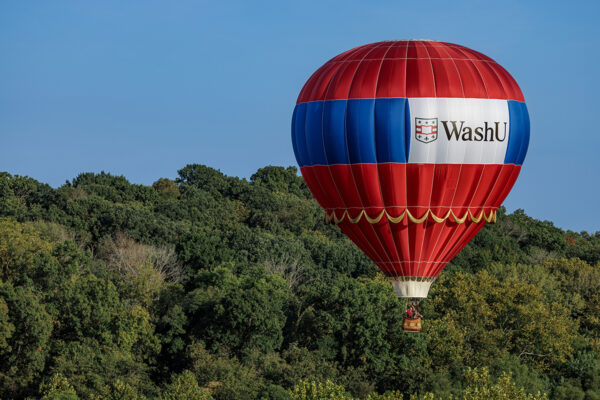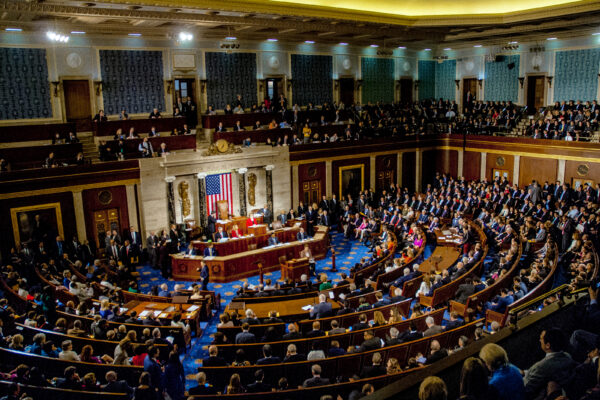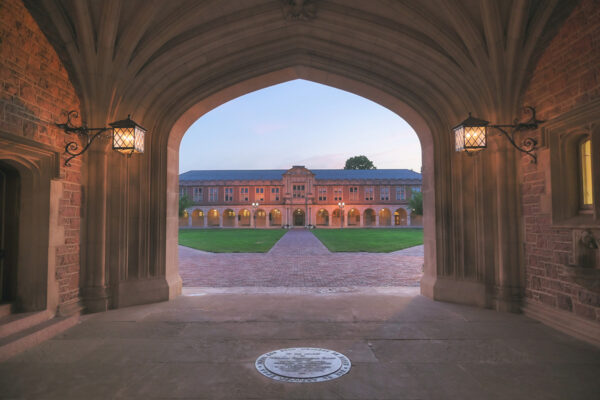As a graduate student in cell biology and physiology, Isaac Plutzer, AB ’20, spends most of his time in a research lab. On Wednesday, Feb. 5, however, Plutzer put on a suit and traveled by bus with 11 other WashU students to Jefferson City, Missouri, to meet with state senators and representatives. The objective was to build relationships and communicate with legislators the importance of WashU’s mission of education, research and patient care.
Plutzer knows firsthand the value of WashU’s research efforts. A doctoral student in the computational and systems biology program, he works closely with adviser Ben Major, the Alan A. and Edith L. Wolff Professor in Cell Biology and Physiology. In Major’s lab, researchers work to understand how alterations in signaling pathways contribute to human cancer, and how that understanding could aid in the development of new diagnostics, prognostics and therapeutic intervention strategies.
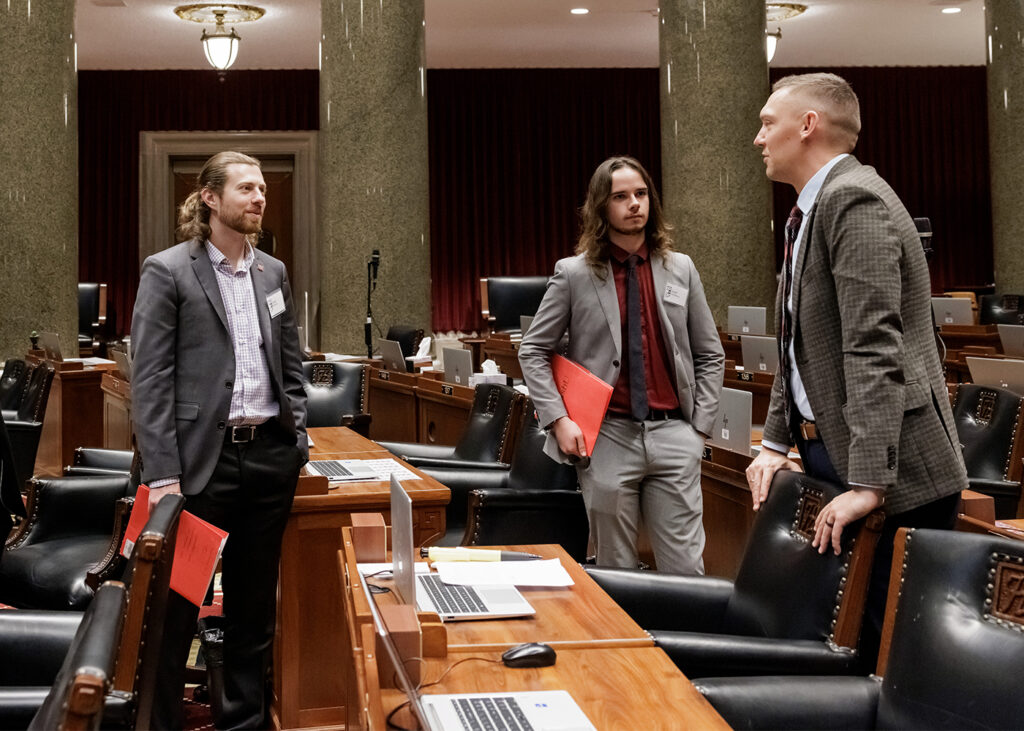
“I think being in Jefferson City in person, as part of WashU’s first Advocacy Day, allowed our voices to rise above the cacophony of other things people might read or hear, and it allowed for back-and-forth discussion,” Plutzer says. “I’m a PhD student at the medical school, and our research is funded by federal money. It’s important to understand the role politics play in that. And it’s important to communicate clearly with representatives about how this research impacts the people in their districts, as well as how the money that WashU is bringing in makes its way back to these communities.”
The Office of Government & Community Relations established the new WashU Advocacy Program to facilitate such meaningful communication. Part of the university’s strategic plan “Here and Next,” the WashU Advocacy Program, according to its website, “envisions WashU as a trusted and reliable source of information, policy analysis and insight for governmental leaders across our region, state and nation.” Tonya Rice, who serves as assistant vice chancellor for advocacy and engagement, is building a robust and active network of advocates and supporters who can testify to the impact of WashU in their lives and communities, and she helped organize the first WashU Advocacy Day in Jefferson City.
In addition to the 12 student advocates, university leaders also engaged in meaningful conversations with legislators in Jefferson City.
Chancellor Andrew Martin was inspired by the experience. “For us, to make personal connections, to see so many different representatives and senators, to be part of the policy-making process — that is experiential learning at its very best,” Martin says. “Our students as WashU Advocates were able to see up close how governance works here in the state of Missouri.”
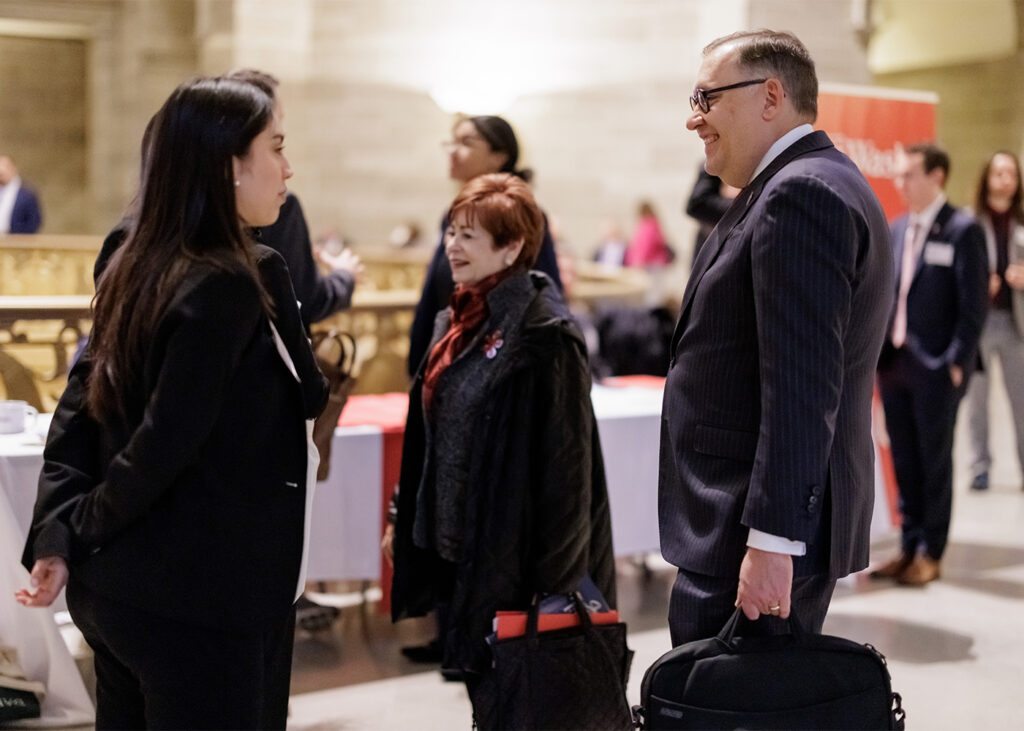
Rice says one encouraging takeaway from the day was the ability to find common ground around nonpartisan support for higher education. Many legislators expressed their commitment to supporting WashU, recognizing its role in the state and local economy, workforce development and critical health-care services.
During meetings throughout the day, WashU Advocates drew on key statistics from the WashU Statewide Impact Map — an interactive dashboard that showcases the university’s extensive contributions and positive influence across Missouri. For example, the map, built by Government & Community Relations in conjunction with WashU’s Information Technology data team, quickly highlights how many WashU students come from Missouri (992), how many of these students receive WashU aid (708), how many receive federal aid (323), and how many receive state aid (565). Total undergraduate financial aid provided for this group equaled $49,391,269 in academic year 2023–2024.
WashU Advocate Chantal Ogbeifun, a sophomore studying pre-law and political science in Arts & Sciences, is one such Missouri native. Ogbeifun grew up in Republic, Missouri, a town of fewer than 20,000 southwest of Springfield. While in high school, she met with Phil Layfield, assistant director for rural recruiting at WashU, and learned about the university’s commitment to providing opportunities for students in rural communities.
“I wanted to be part of WashU Advocacy Day because I wanted to share my story,” she says. “I wanted legislators to hear what it’s like to go from a small, rural city in Missouri to a school that is often unattainable or seems out of reach for students like me, who might not have the finances or might not have the awareness that higher education is possible.”
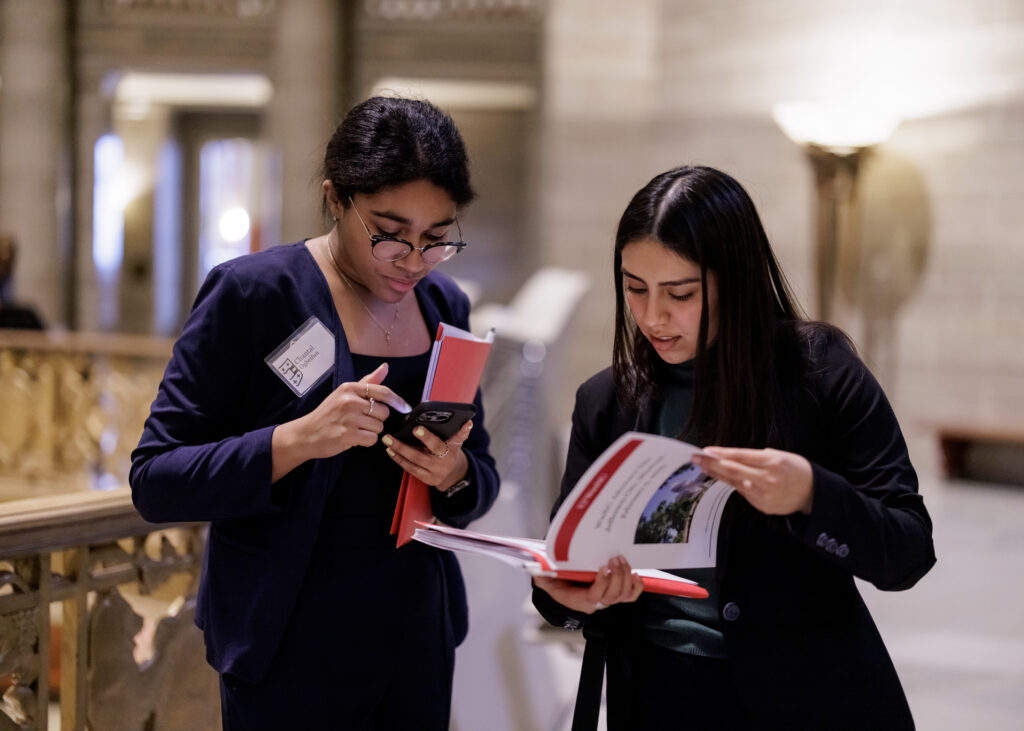
At WashU, Ogbeifun is a Danforth Scholar, having received a scholarship awarded to students who have demonstrated leadership in service and a strong commitment to community. “I’m advocating for all the students who think that higher education is impossible,” she says. “My parents both immigrated to the United States, and they couldn’t get this type of education. I wanted to tell legislators that WashU is doing a lot of good in our community by offering accessible education to everyone.”
Rice and her team prepared students like Ogbeifun for WashU Advocacy Day. Among the training initiatives, students were asked to prepare a description about themselves and WashU’s influence on their lives and education. “Legislators were especially engaged when students shared their personal experiences about how the university has impacted their lives, particularly with financial aid and scholarships,” Rice says. “And students gained a deeper understanding of legislative priorities and processes, and how to effectively communicate key messages to elected officials.”
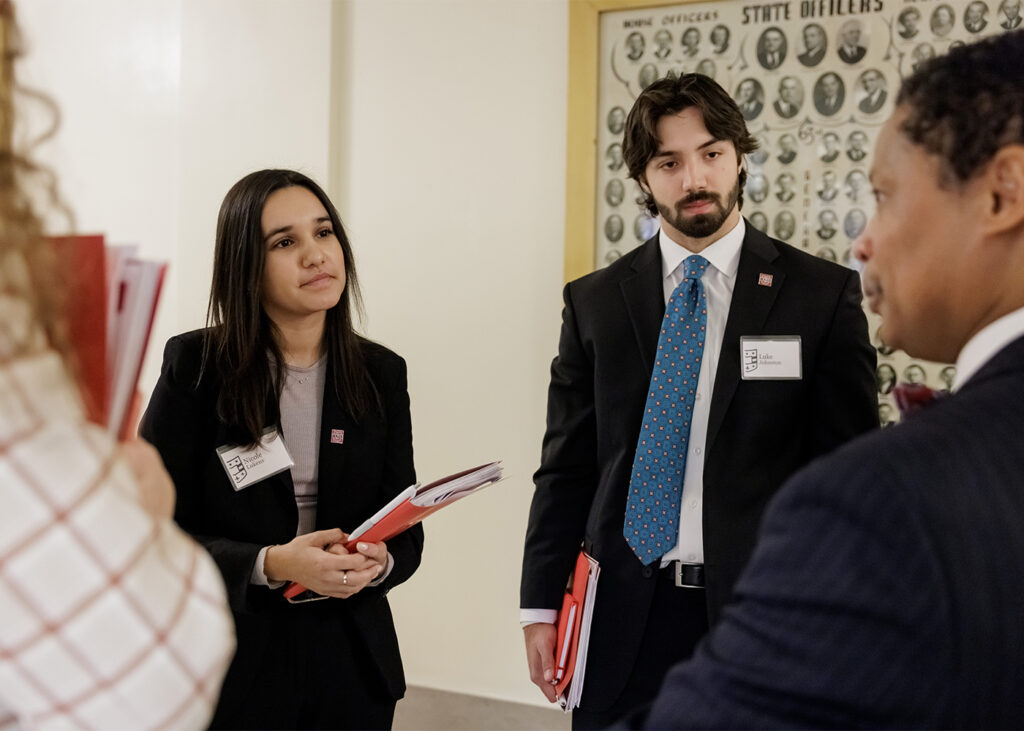
The success of the inaugural event provides a strong foundation for future WashU advocacy efforts. Over time, the WashU Advocacy Program aims to engage more students, alumni, faculty, staff, parents and friends of WashU.
“Advocacy doesn’t end after one day. It’s a continuous process that requires ongoing engagement and relationship building with policymakers,” Rice says. “We encourage continued dialogue with government officials across the state of Missouri to advocate for WashU. We also want to highlight more student, faculty and staff achievements that demonstrate the tangible impact of WashU’s educational initiatives, research and innovation on the state’s economy, and patient care by WashU physicians.”
Communicating such key messages to elected officials at every level — local, state and federal — is the goal.
Rice says one of the program’s key objectives is to harness the messaging power of alumni, and she invites alumni from any region, as well as any WashU community member, to get involved in the program in Missouri and in outreach at the national level.
“By participating in WashU Advocates, alumni can give back in a meaningful way, help support the university’s future for years to come and advance our communities together,” Rice says. “The success and long-term sustainability of the university, strength of professional networks, and opportunities available to future generations requires the collective action of our full community.”
These cuts, if made permanent, would jeopardize “the incredible strides we’ve pioneered in cancer therapeutics, progress toward a cure for Alzheimer’s, and nearly every other federally sponsored research activity on our Medical School and Danforth campuses.”
Chancellor Andrew Martin
And collective action is needed now. On Feb. 13, Chancellor Martin emailed 164,000 alumni, parents, donors, faculty and staff in the United States. In the message, Martin detailed how the university had received an announcement Feb. 7, without warning, from the National Institutes of Health. In the note, the NIH stated that it was changing its policy and significantly reducing research support funding that Washington University and other institutions receive to conduct groundbreaking research. These cuts, if made permanent, Martin explained, would jeopardize “the incredible strides we’ve pioneered in cancer therapeutics, progress toward a cure for Alzheimer’s, and nearly every other federally sponsored research activity on our Medical School and Danforth campuses. It also would weaken the economic impact we have in our region and state.”
Then Martin made a direct plea: “I am asking you to take a few minutes today and contact your member of Congress and ask them to help reverse this decision by the NIH. Your elected officials can do this by either helping pass legislation to block the reduction, or by persuading the NIH to reverse their decision. Both are equally impactful. More importantly, by adding your voice to this debate, you will send a clear signal to your member of Congress that efforts to weaken life-saving research should be met with broad, bipartisan opposition.”
To advocate for WashU and advance our communities together, visit Join WashU Advocates.
To learn more about the WashU Advocacy Program, visit the Office of Government & Community Relations’ Advocacy & Engagement page.
